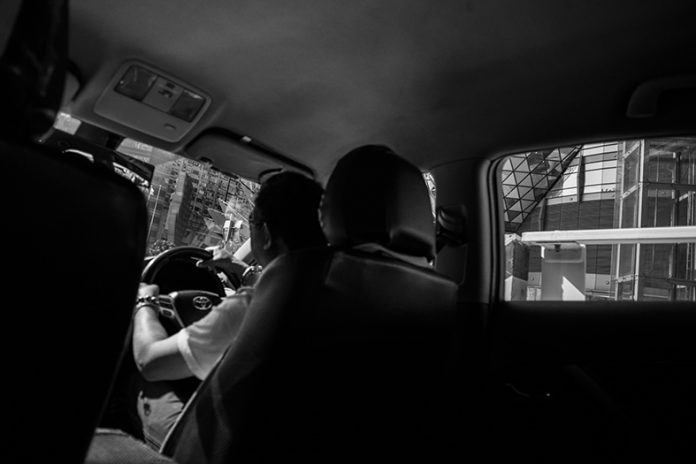Albeit the recent turmoil of COVID-19, the value of permanent taxi licenses here has remained pretty stable at MOP6 million
It was once as expensive as a high-end, large-sized flat during the golden days of the casinos here, fetching as much as over MOP10 million. But nothing lasts forever. Following the adjustment period of the gaming industry in the 2014-2016 period, it has depreciated by 40 percent — and this is taxi license.
As taxi drivers are struggling to find clients nowadays in the face of travel restrictions in place to fight the global pandemic of the novel coronavirus (COVID-19), the taxi license price here has largely remained unchanged though.
Before COVID-19 the daily business turnover of a taxi driver for a shift — usually two shifts a day per taxi here, daytime and evening shifts — could reach at least MOP1,000, but their income has evaporated in recent weeks. “We earn merely about MOP100 a day now during the virus outbreak,” says Tony Kuok Leong Son, President of the Macau Taxi Drivers Mutual Help Association. “We had originally expected the business would have become better [in April], given the easing signs of the outbreak in Mainland China and here.”
Macau had remained COVID-19 free for nearly 40 days before the second wave of new cases broke out starting from March 15 and onwards. The latest string of cases has forced the Macau administration to ban the entry of visitors from non-Greater China regions since March 25. Travellers from Hong Kong and Taiwan have to undergo a 14-day quarantine upon entry to the gambling enclave, in addition to the fact that Beijing has suspended tour groups and issuing new Individual Visit Scheme (IVS) permits for the mainlanders to visit Macau since end-January.
“We could only rely on the domestic demand for business, but residents seldom take taxis nowadays,” Mr. Kuok remarks, adding he only expects the business will start to resume recovery after the travel restrictions have been lifted.
Investment vehicles
The situation is similar in the nearby special administrative region (SAR). Amid the bleak business fundamentals, the value of taxi licenses in Hong Kong — which are regarded by many as investment vehicles in both SARs — has taken a beating. According to Hong Kong Taxi Exchange, a platform that compiles figures for the transactions of taxi licenses in the Asian financial centre, a license for New Territories taxis only fetched HK$4.2 million as of March this year, down by close to 15 percent year-on-year and nearly 5 percent from the end of last year. Concerning a license for an urban taxi — which can operate in most parts of Hong Kong, including Hong Kong Island, Kowloon and New Territories — the latest price was about HK$5.1 million, retreating close to 10 percent from the peak in early last year.
Nonetheless, the Macau taxi license is another story. “The taxi license price has been pretty stable in recent times at about MOP6 million, unlike the declines in Hong Kong, amid the darkest days for the taxi industry,” says Leng Sai Hou, President of the General Association of Macau Taxi Owners. “It [MOP6 million] is commonly a price level that both the sell side and buy side could agree on.”

“The taxi license price has been pretty stable in recent times at about MOP6 million, unlike the declines in Hong Kong, amid the darkest days for the taxi industry” – Leng Sai Hou, president of the General Association of Macau Taxi Owners.
The price level Mr. Leng mentions does not cover all the taxi licenses, but only the permanent ones. Latest official figures show there are 1,900 valid taxi licenses in the territory, and 650 of them are permanent taxi licenses, which can be resold and have an indefinite valid period. For the remainder, there are only taxi licenses with a valid period of eight years and re-sales are not permitted, including 300 ‘special taxis’ operated by Macau Radio Taxi Services Ltd.
The Macau government has started issuing taxi licenses with a definite period since 2005 to deprive taxi licences of their investment value in a bid to improve the overall service quality. Nonetheless, the permanent taxi licenses have remained largely to be pursued by investors.
Limited sales
In consideration of the monthly rental of a taxi shift between MOP16,000 and MOP20,000, the annual yield rate of the MOP6-million taxi license — including the cost of a MOP200,000 vehicle but excluding other costs — could range between 6.2 percent and over 7.7 percent. The investment return is much higher than the annual yield of less than 2 percent for flats and shops here, and the yield of about 3 percent for office space.
Sources in the taxi industry add quite a few local taxi licenses are owned and run by figures linked to local casino industry and tourism operators, provided as a transportation means for high rollers and clients. Thus, at the peak of the gaming industry in the 2013-2014 period, a permanent taxi license could be worth over MOP10 million.
“Unless the license holders are in need of money or due to other reasons, they will not easily put up their licenses for sale” – Leng Sai Vai, president of Commercial Vehicles’ Owners Association of Macau.
The value has later gone down back to the MOP6 million level in the wake of the adjustment of the gaming industry over the anti-corruption campaign in Mainland China and more taxi licenses coming down the pike — the government has issued 1,050 new taxi licenses, including 300 ‘special taxi’ licenses, in the 2014-2019 period, nearly doubling the number of taxis in the territory. And an eight-year taxi license only fetched between MOP810,100 and over MOP988,000 in the latest round of public bidding exercise in 2018.
However, only a limited number of permanent taxi licenses change hands each year. “There are constant enquiries about permanent taxi licenses from time to time, however not many enquiries successfully lead to sales, with fewer than 10 transactions a year,” says Leng Sai Vai, President of the Commercial Vehicles Owners’ Association of Macau.
“Unless the license holders are in need of money or due to other reasons, they will not easily put up their licenses for sale,” he reasons.

100 more in place
The operational capacity of ‘special taxi’ operator, Macau Radio Taxi Services Ltd, will increase by half with 100 more vehicles coming to the pipeline in the second half of this year.
The operator noted it now has 200 ‘special taxis’ running across the territory with 100 becoming operational in December last year. The firm — backed by local travel industry figure Cheong Chi Man and Golden Dragon Group Co Ltd that is under the helm of political heavyweight and businessman Chan Meng Kam — won a public tender last year to run an additional batch of 200 ‘special taxis’ for an eight-year tenure, after managing 100 taxis since April 2017.
‘Special taxis’, either in blue or red colour, can only be hailed by telephone, via website or mobile application, and must be run by a company, according to local legislation. The other type of taxis in the city, or what the public call ‘black taxis’ due to the colour of the vehicles, is run by individuals and can be hailed in the street.
Latest official figures show there were 1,797 taxis running across the territory, including both ‘black taxis’ and ‘special taxis’, as of this February, while the number of valid taxi licenses totalled 1,900.
Macau Radio Taxi noted the remaining half of the 200 additional taxis would “gradually be in place throughout the second half of this year” to “better serve the local community.”
It also noted the outbreak of the novel coronavirus (COVID-19) has dampened its business, with the number of daily orders plunging by more than half from up to 7,000 before the pandemic to about 3,000 now. However, the operator pledges it would not cut down its headcount of drivers, which stands at over 300 at the moment, as well as their basic salaries.
























